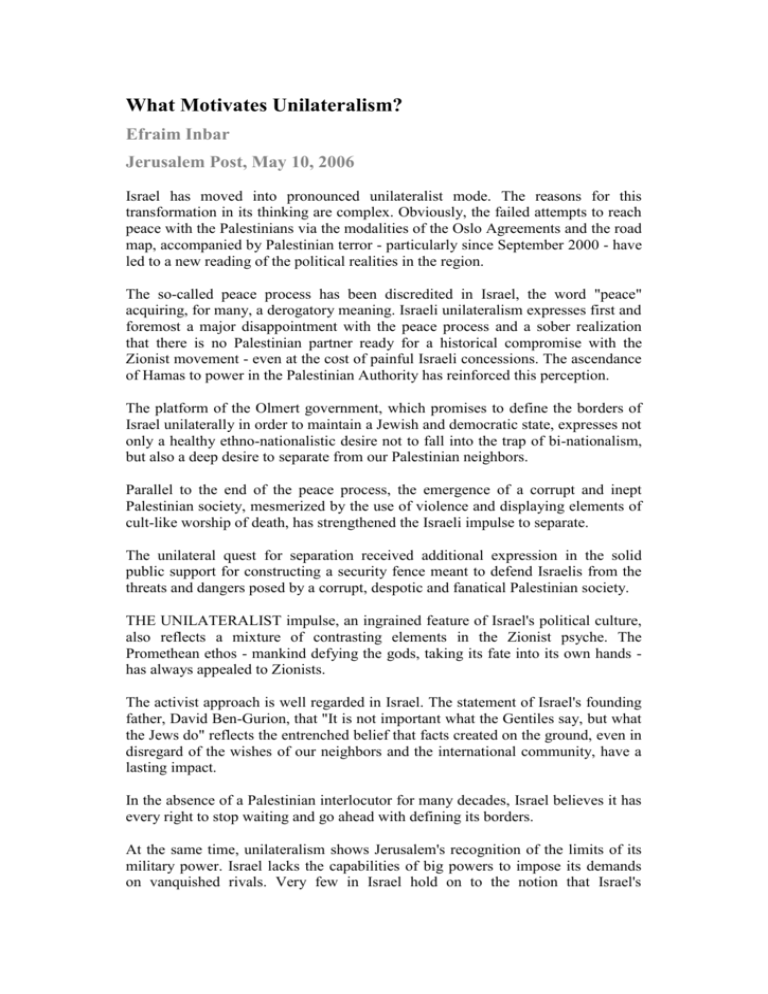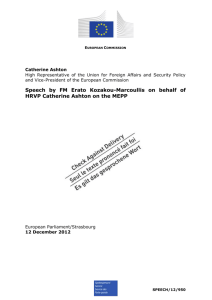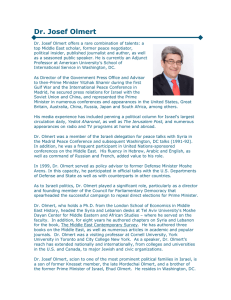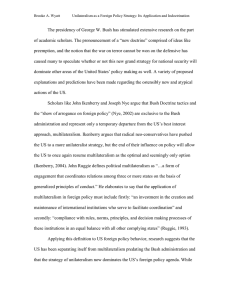What Motivates Unilateralism?, The Jerusalem Post, May 10, 2006
advertisement

What Motivates Unilateralism? Efraim Inbar Jerusalem Post, May 10, 2006 Israel has moved into pronounced unilateralist mode. The reasons for this transformation in its thinking are complex. Obviously, the failed attempts to reach peace with the Palestinians via the modalities of the Oslo Agreements and the road map, accompanied by Palestinian terror - particularly since September 2000 - have led to a new reading of the political realities in the region. The so-called peace process has been discredited in Israel, the word "peace" acquiring, for many, a derogatory meaning. Israeli unilateralism expresses first and foremost a major disappointment with the peace process and a sober realization that there is no Palestinian partner ready for a historical compromise with the Zionist movement - even at the cost of painful Israeli concessions. The ascendance of Hamas to power in the Palestinian Authority has reinforced this perception. The platform of the Olmert government, which promises to define the borders of Israel unilaterally in order to maintain a Jewish and democratic state, expresses not only a healthy ethno-nationalistic desire not to fall into the trap of bi-nationalism, but also a deep desire to separate from our Palestinian neighbors. Parallel to the end of the peace process, the emergence of a corrupt and inept Palestinian society, mesmerized by the use of violence and displaying elements of cult-like worship of death, has strengthened the Israeli impulse to separate. The unilateral quest for separation received additional expression in the solid public support for constructing a security fence meant to defend Israelis from the threats and dangers posed by a corrupt, despotic and fanatical Palestinian society. THE UNILATERALIST impulse, an ingrained feature of Israel's political culture, also reflects a mixture of contrasting elements in the Zionist psyche. The Promethean ethos - mankind defying the gods, taking its fate into its own hands has always appealed to Zionists. The activist approach is well regarded in Israel. The statement of Israel's founding father, David Ben-Gurion, that "It is not important what the Gentiles say, but what the Jews do" reflects the entrenched belief that facts created on the ground, even in disregard of the wishes of our neighbors and the international community, have a lasting impact. In the absence of a Palestinian interlocutor for many decades, Israel believes it has every right to stop waiting and go ahead with defining its borders. At the same time, unilateralism shows Jerusalem's recognition of the limits of its military power. Israel lacks the capabilities of big powers to impose its demands on vanquished rivals. Very few in Israel hold on to the notion that Israel's technological, economic and military superiority could force the Arabs to sign a peace treaty. In a way, unilateralism also pragmatically recognizes that while Israel's neighbors cannot bring themselves to formally agree to its demands, they could, informally, accept an Israeli-designed status quo. The free movement of people and goods over the Jordan bridges after 1967 is a clear example of a unilateral and informal arrangement that held for many years. THE APPEAL of unilateral steps, including the completion of the separation fence, is probably also an expression of the naive aspiration for a simple solution. The Peace Now slogan was given a try. Now it is the turn of "us on one side, them on the other." And the idea is convincing and attractive, even though Palestinian terrorism does not really allow Israel to disengage from the territories. (The IDF continues its forays into the Palestinian cities in its counterterror campaign, and as Kassam rockets are relentlessly fired into Israel the not very enticing option of reoccupying Gaza is being openly discussed.) Unilateralism also testifies to the impatience of some Jews. The need for immediate satisfaction is unfortunately widespread. The focus on today and tomorrow, while ignoring the uncertainty of the day after, is human, but not necessarily wise. Like many other societies, Israel's has difficulty absorbing complex situations and prefers simple dichotomies. It is psychologically difficult to digest the instruction to "grin and bear it" during a protracted struggle over your own home. Current Israeli unilateralism carries the illusion that Israel will be able to cease living by its sword. In fact, the Israeli leadership understands that pure unilateralism, appealing as it may be to the people, is not a true policy option. The withdrawal from Gaza was not entirely unilateral as it was approved first in Washington and only afterwards by the Israeli cabinet. Leaving the Palestinians to their own devices may well be what they deserve, but even Israeli unilateralists view international involvement positively in order to prevent a large-scale humanitarian disaster in the Palestinian territories. Moreover, the Olmert government intends to secure international support - or at least some level of understanding for its unilateral program. Nevertheless, the future of Olmert's program will probably be determined by domestic factors, rather than by whatever international support he may gather. The writer is professor of political studies at Bar-Ilan University and the director of the Begin-Sadat Center for Strategic Studies (BESA).










